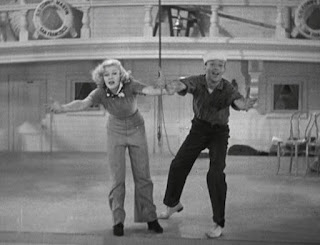Before the screen, we had the stage. Scripts and stars, all ready to go - it's a no-brainer to bring them direct from the proscenium to the soundstage. And yet, because they are different mediums, and because studios have staff to be paid, the transition is rarely so direct - even when it's a Shakespeare adaptation. Here are seven films, some of which are practically word-for-word as they appeared on Broadway, most of them...not.
Anything Goes
What a year Cole Porter was having, between his original movie musical Born to Dance and this adaptation of his most popular stage one, give or take a Kiss Me, Kate. Follows the plot of the 1934 play pretty closely, with Ethel Merman bringing her interpretation of Reno Sweeney from stage to screen, and doing marvelously - her mid-air rendition of "I Get a Kick Out of You" is only equaled by her "Shanghai-Dee-Ho" is only surpassed by her seduction of Arthur Treacher's stuffy baronet Evelyn Oakleigh. Bing Crosby is our young hero who remains on board a transatlantic cruise ship to romance heiress Hope Harcourt (Ida Lupino) and befriends Moonface Martin, Public Enemy #13 (Charles Ruggles - oh, what a superb performance!). Great songs, even the new non-Porter ones, great antics.
Ceiling Zero
Based on the 1935 play of the same name by aviator Frank Wead (later portrayed by John Wayne in The Wings of Eagles) about mail carriers forced to fly in low-visibility conditions. James Cagney plays the hotshot, skilled but irresponsible, with Pat O'Brien as his best friend who now manages operations for an airline. Stuart Erwin turns in the best performance as a fellow pilot; his supporting actor nomination is no surprise, but that it was for Pigskin Parade instead of this definitely is.
Follow the Fleet
Based on Hubert Osborne's 1922 play Shore Leave, which was first filmed under that title in 1925 with Richard Barthelmess in the lead. This version re-teams Fred Astaire and Ginger Rogers for a fifth time, with the source play's main narrative turned into a subplot. Astaire and Randolph Scott are on shore leave, Rogers is a former flame of Astaire's with an opportunity to break into legit showbiz, and Harriet Nelson (Hilliard at the time, she and Ozzie Nelson married just four months before the film's release) is Rogers' wallflower sister who falls in love with Scott. The standout here is Hilliard-Nelson, who gets to introduce Irving Berlin's "Get Thee Behind Me, Satan." She is the main character of the original play, so she's already working with a more developed character, but her natural comedic and musical skills threaten to steal the film from the headliners.
Go West, Young Man
Based on the 1934 smash hit Personal Appearance, written not by Mae West but by Lawrence Riley. The original Broadway production was directed by Antoinette Perry (for whom the Tony Awards were named) and starred Gladys George. It takes almost half the movie to get to the plot, in which movie star Mae West's car breaks down in a small town where the locals are agog at having a celebrity in their midst, and she starts a flirtation with a local boy (Randolph Scott, hunky). Some laughs courtesy West's usual "come hither" schtick, but no great shakes overall.
Klondike Annie
Mae West adapted her own stage play, Frisco Kate, for this one. the story of a club singer/gangster's mistress who kills her lover, escapes via ship to Alaska, befriends a spinster missionary, and assumes the woman's identity when she dies suddenly. West gets in her double entendres, does songs like "An Occidental Woman In An Oriental Mood for Love" and "It's Better To Give Than To Receive," and her scenes with Victor McLaglen eschew winks and nods in favor of blunt horniness. Yet the very nature of the story requires West to have a change of heart, a desire to do right by herself and the missionary and the Faith, rather than just escape to the next best thing. It feels like her heart is in this one to a greater degree than Go West, Young Man, with her character's arc coming off genuinely sincere. It's a thoughtful film about...I don't want to say redemption, but about Getting Right. Of course, the play was written in the wake of her mother's passing, so that may account for it.
The Milky Way
Based upon a 1934 play whose original Broadway cast included, again, Gladys George! The play took place entirely in the hotel room of prizefighter Speed McFarland. The film has only two scenes there, the rest following milkman Burleigh Sullivan from clumsy milkman to accidental boxer. Deadpan Harold Lloyd ducks, leaps, and ducks some more as Burleigh, Adolphe Menjou an unscrupulous manager, Lionel Stander plays an idiot, Verree Teasdale a vixen: all are great. An unlikely scenario mined for every possible laugh: it's quite funny.
The Petrified Forest
From the 1934 play by Robert E. Sherwood, with original Broadway stars Leslie Howard and Humphrey Bogart reprising their roles as, respectively, a depressed writer and a gangster. They drift into a diner in the middle of nowhere run by Bette Davis's family and things...well, things don't happen, but people certainly talk. How to judge a film like this, where the performances aren't bad, the cinematography lovely, the sets probably among the best of the year...and the script just so much moaning and groaning bullshit? It's really good, except for everything they're saying and doing!
Tomorrow, the last of the films watched for this 1936 retrospective.








No comments:
Post a Comment